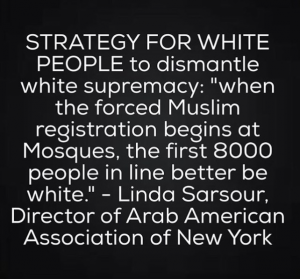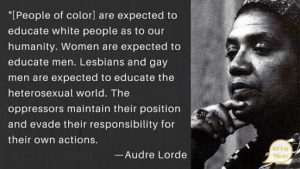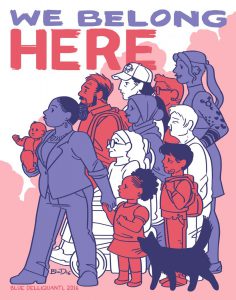A friend posted this on fb:
“[People of color] are expected to educate white people as to our humanity. Women are expected to educate men. Lesbians and gay men are expected to educate the heterosexual world. The oppressors maintain their position and evade their responsibility for their own actions.
-Audre Lorde”*)
[Note: the phrase ‘people of color’ replaces Lorde’s original words, which are ‘Black and Third World People”. I think it’s important to use Lorde’s original words, as she is using ‘black’ deliberately, and referring to the ‘third world’ in a particular way. She wants to talk about developing nations (the global south), and she wants to talk about black americans. This is not the same as ‘people of color’.]
And a white bloke commented
I think that everyone can educate (read: teach) everyone else a thing or two. It’s not a burden but an opportunity, as long as they are willing to learn.
And it gave me the living shits.
So I replied:
…if it’s the people with the least amount of power (time, capital, etc) with the greatest responsibilities for teaching the most powerful…. hm.
This is one element of oppression: forcing people to continually justify their existence. To have them say, over and over again, “I have a right to exist.”
It also makes women, POC… basically everyone but white, straight men responsible for white straight men’s behaviour and thinking.
In a society where institutions, discourses, and ideology make difference invisible, undesirable, problematic, pathologised, or ‘other’, the marginalised have to continually say “I exist. I have a right to exist.” Because they do not exist in media discourse, in political discourse, in social discourse. They are marginalised, disallowed access to places of power.
White straight men occupy the positions of power and influence: they make laws, they are heroes in stories, they have cultural capital, they are religious leaders. Everything in our society says, “White men exist. White men are important.”
The crux of this is that fact that the most powerful people – white, straight, men – have the most power and the least responsibility to others. Which is how patriarchy works. There’s a Greer line: the opposite of patriarchy is not matriarchy, but fraternity. The idea of mutual responsibility.
This is why white, straight men should take the greatest responsibility in dismantling patriarchy. But they don’t, because they are the ones who benefit most from this system.

(image text reads: Strategy for white people to dismantle white supremacy: “when the forced Muslim registration begins at Mosques, the first 8000 people in line better be white.” – Linda Sarsour, Director of Arab American Association of New York”)
(source, but note, I don’t have a good reference for this text.)
And then that white bro continued, despite being told, by a number of people in a range of ways “Stop.”
One of the most useful comments was a link to this good cartoon about tone policing.
I always miss that, because I’m either too angry and replying or too angry to reply. I do like the reminder about tone policing. But the white bro totally missed the point: that anger is important. He missed the point of the original post: that marginalised folks spend all their time justifying their existence, while the powerful continue on oblivious. It was almost painful to see such a complete lack of self-reflexivity, mansplaining of being a woman to women, and just general fuckwittery.
Another good response linked up Feminists are not responsible for educating men.
And even after that, he posted
Of course people are allowed to get angry, and are perfectly justified in doing so. It’s not about that. I just don’t think it’s the most effective way of enacting change.
If someone came up to you and demanded angrily that you respect them for something that you have no appreciation of, your first response may well be a beligirent one.
If you build empathy first, it can turn out very differently.
And after a couple of snarks in response, I thought, ‘Why I am wasting my time with this deadshit? Why not continue the thoughts and ideas raised by the initial post? So I went and looked up the reference for that Audre Lorde quote. And posted:
I was just thinking ‘this is real-time version of that tone policing cartoon’. Then I thought, ‘how come this discussion became all about some bro’s feels?’ and then I checked [the] original post, and I remembered: while we’re busily justifying our existence and the legitimacy of our concerns and modes of engagement, “the oppressors maintain their position and evade responsibility for their own actions.”
The reference for this quote is Audre Lorde, ‘Age, Race, Sex, and Class: Women Redefining Difference, from the collected works publication ‘Sister Outsider: Essays and Speeches,’ Random House: NY, 1984. You can read the whole thing here.
So I want to stop responding to one man doing some ‘tone policing’, and I want to move this discussion back to its original point: that it is not our responsibility to educate men (or whites, or straights, or…). Our anger is important. It is both creative and empowering; it need not be destructive (though it can be), it need not be irrational (though it can be). It is borne out of our own lived experiences, our own lives.
Lorde had a profound influence on me when I was in my late teens and first discovering feminist writing at uni. Re-reading her work (and thanks for linking it up, Georgia!), I can see just how inspiring and influential her poetic language has been on my own writing. The mode of communication is as important as the content. At every point.
In this speech she describes a ‘mythical norm’ (white, male, christian, etc). In this same piece she explains how focussing on one point of difference from this norm (race, gender, sexuality, etc) is limiting. I think this is a very clear example of a discussion of intersectionality and its importance to feminism or a social justice project.
The next chapter is called, “The Uses of Anger: women responding to racism”, and it’s very exciting. An insistence on sitting down, being polite, being kind, being gentle, being loving, is a key part of patriarchal policing of women and girls. We aren’t allowed to be angry.
But I think it was Lorde who made it clear to me that being angry is a feminist act. Saying, “No!” and “Stop!” is a feminist act in itself. This is why I think we, particularly in the lindy hop scene, need to practice saying ‘no!’ Not only because it means we’ll be ready when it comes time to stay ‘NO!’ but also because the act of saying no, of being ‘disagreeable’ is profoundly empowering for women. Who are trained from birth to avoid conflict. To be nice. To be pacific. To be kind, and at all costs to preserve the peace of mind of men.
Lorde writes:
Women respond to racism. My response to racism is anger. I have lived with that anger, ignoring it, feeding upon it, learning to use it before it laid my visions to waste, for most of my life. Once I did it in silence, afraid of the weight. My fear of anger taught me nothing. Your fear of that anger will teach you nothing, also.
Women responding to racism means women responding to anger; the anger of exclusion, of unquestioned privilege, of racial distortions, of silence, ill-use, stereotyping, defensiveness, misnaming, betrayal, and co-option.
My anger is a response to racist attitudes and to the actions and presumptions that arise out of those attitudes. If your dealings with other women reflect those attitudes, then my anger and your attendant fears are spotlights that can be used for growth in the same way I have used learning to express anger for my growth.”(“The Uses of Anger: women responding to racism” in Sister Outsider, 1982:pg 124)
And I went straight to abebooks and bought a copy. I’d forgotten how exciting Lorde is. And inspiring she was to me as a young feminist.
And even after that, the same white bro chimed in with yet another ‘poor me’ comment.
I wanted to post this here so I could remember how exciting it was to rediscover Lorde after so many years. I didn’t want that man to rob me of this excitement. And I wanted to block him and his pathetic ‘poor me’ bullshit.
I’ve seen a few too many posts getting around on fb lately, exhorting patience and understanding for Trump supporters, for racists. I don’t want to bring peace first. I want to be angry. Because it is very important to be angered by these things, and not to ‘accept’ them (with peace or otherwise). This is not a time for gentleness. It is a time for activism and anger.
*It’s worth noting that Lorde writes
This is an old and primary tool of all oppressors to keep the oppressed occupied with the master’s concerns. (pg 113)



Perceived-as-straight white woman here. One thing I’m trying to sort out is how the privileged can take the greatest responsibility for dismantling oppression,and in the case of gender, whether that’s something I would even want. I can imagine it in the sense of men telling other men to shut up and listen to women, but beyond that, how do men take responsibility without continuing to give power to themselves and mucking it up?